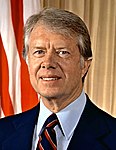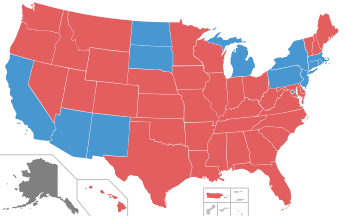| |||||||||||||||||||||||||||||
3,346 delegates to the Democratic National Convention 1,674 (majority) votes needed to win | |||||||||||||||||||||||||||||
|---|---|---|---|---|---|---|---|---|---|---|---|---|---|---|---|---|---|---|---|---|---|---|---|---|---|---|---|---|---|
| |||||||||||||||||||||||||||||
Carter Kennedy Uncommitted | |||||||||||||||||||||||||||||
| |||||||||||||||||||||||||||||
From January 21 to June 3, 1980, voters of the Democratic Party chose its nominee for president in the 1980 United States presidential election. Incumbent President Jimmy Carter was again selected as the nominee through a series of primary elections and caucuses, culminating in the 1980 Democratic National Convention, held from August 11 to 14, 1980, in New York City.
Carter faced a major primary challenger in Senator Ted Kennedy of Massachusetts, who won 12 contests and received more than seven million votes nationwide, enough for him to refuse to concede the nomination until the second day of the convention. This remains the last primary election in which an incumbent president's party nomination was still contested going into the convention.
Jimmy Carter would be the last incumbent president to lose a primary in any contest, until Joe Biden lost to Jason Palmer in the 2024 American Samoa Democratic presidential caucuses.[2] For the Democrats in 1980 a then-record of 37 primary races were held.[3]
Cite error: There are <ref group=lower-alpha> tags or {{efn}} templates on this page, but the references will not show without a {{reflist|group=lower-alpha}} template or {{notelist}} template (see the help page).
- ^ a b "DISENCHANTED". The Boston Globe. Boston, Massachusetts. July 1, 1980. Retrieved April 2, 2024.
- ^ Bickerton, James (March 7, 2024). "Joe Biden is first incumbent president to lose a primary in 44 years". Newsweek. Retrieved March 11, 2024.
- ^ Kalb, Deborah (2015). GUIDE TO U.S. ELECTIONS. CQ Press. ISBN 9781483380384 – via Google Books.
In 1980 a then-record thirty-seven primaries (including those in the District of Columbia and Puerto Rico) provided more opportunity for mass participation in the nominating process than ever before.





